Why Nations Fail Illustrated
Lecture 9
Iron Law of Oligarchy
Persistence of extractive institutions
in Guatemala, US South, Sierra Leone, Ethiopia
December 3, 2018
Masayuki Kudamatsu
Chapter 12
Extractive Economic Institutions
Economic Stagnation
Extractive Political Institutions
Today's theme:
Feedback loop of extractive institutions
Either by the same set of the ruling class (Guatemala, US South)
or despite leadership changes (Sierra Leone, Ethiopia)

Today's Road Map
Guatemala before/after independence
US South before/after American Civil War
Sierra Leone before/after independence
Ethiopia before/after 1974 coup

Today's Road Map
Guatemala before/after independence
US South before/after American Civil War
Sierra Leone before/after independence
Ethiopia before/after 1974 coup
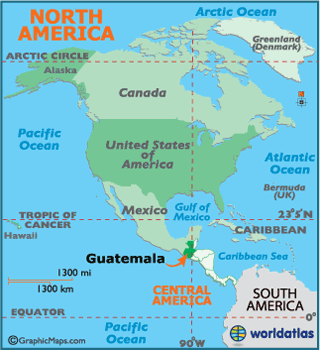
Image source: worldatlas.com
Spanish colonial rule
Encomienda / Repartimiento (cf. Lecture 6)
Land allocated to conquistadors
Consulado de Comercio
Merchant guild: monopolize trade
Forced labor
| economic institutions | ||
|---|---|---|
| Secure for everyone |
Property rights | Insecure for majority of people |
| Free | Occupational choice |
Forced labor |
| Free | Entry of new businesses | Prevented by monopolies |
| Unbiased | System of laws | Biased for the powerful/rich |
| Promoted | Public service provision | Discouraged |
Economic Institutions
Inclusive
Extractive
Property rights
Secure for everyone
Insecure for majority of people
Occupational choice
Free
Forced labor
Entry of new businesses
Free
Prevented by monopolies
System of laws
Unbiased
Biased for the powerful / rich
Public service provision
Provided
Limited
That is...
Rafael Carrera's dictatorship (1839-65)
Same set of extractive institutions: inherited
Consulado de Comercio
Encomienda / Repartimiento
Refuse to build ports & roads for Pacific coast
Guatemala became independent in 1821
Cadiz Constitution of post-Napoleon Spain:
unacceptable to colonial elite (cf. Lecture 6)
Consulado de Comercio
Now in charge of building infrastructure for development

Why Consulado resisted building infrastructure?
Which would undermine the monopoly of trade by Consuldado
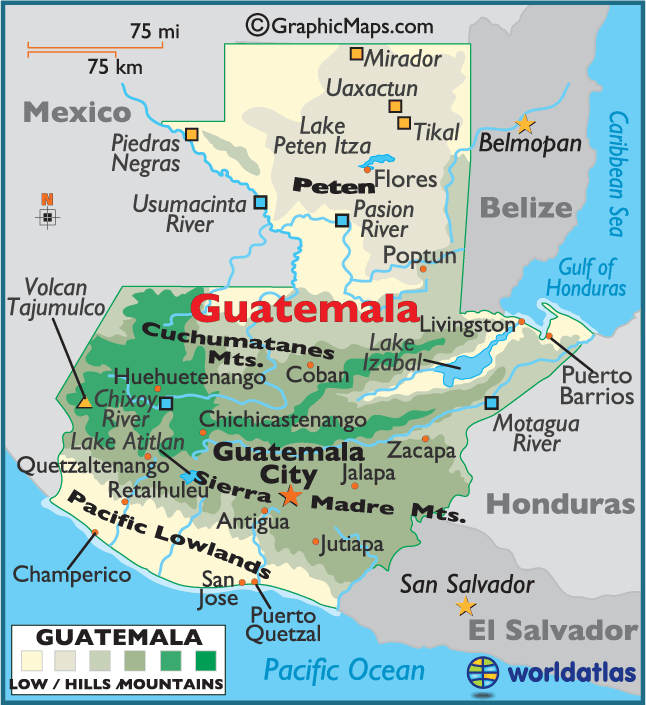
Image source: worldatlas.com
Ports existed only on the Caribbean coast, controlled by Consulado de Comercio
New ports on the Pacific (& roads towards them) would allow Quetzaltenango to export cheaply
| economic institutions | ||
|---|---|---|
| Secure for everyone |
Property rights | Insecure for majority of people |
| Free | Occupational choice |
Forced labor |
| Free | Entry of new businesses | Prevented by monopolies |
| Unbiased | System of laws | Biased for the powerful/rich |
| Promoted | Public service provision | Discouraged |
Economic Institutions
Inclusive
Extractive
Property rights
Secure for everyone
Insecure for majority of people
Occupational choice
Free
Forced labor
Entry of new businesses
Free
Prevented by monopolies
System of laws
Unbiased
Biased for the powerful / rich
Public service provision
Provided
Limited
That is...
Impacts of the 1st globalization since 1870
cf. Lecture 6
Guatemala: suitable
for growing coffee
people's income
in Western Europe
& North America
Transportation cost
due to steamships
Exporting coffee:
hugely profitable
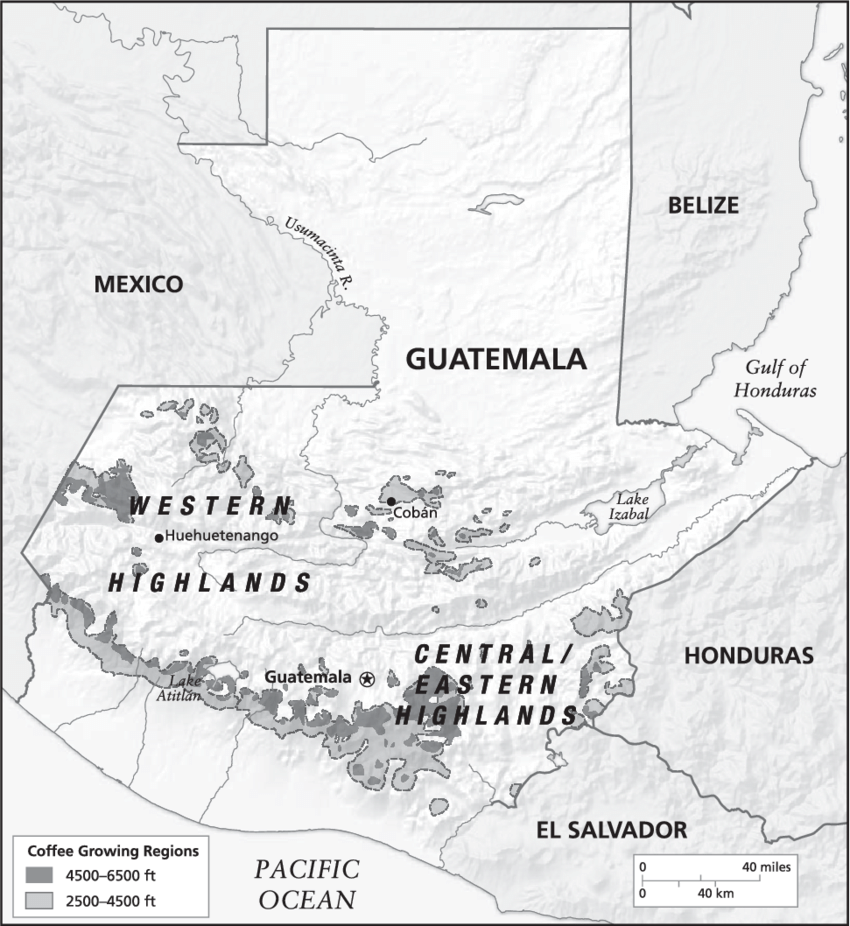
+
+
Source: Figure 1 of Fischer and Victor (2014)
"Liberals" since 1871
Repartimiento expanded by various laws since 1877
Employers could request up to 60 workers for 15 days of work
from government
Grab lands previously owned communally or by government
1,000,000 acres of land taken by the elite during 1871-1883
These workers could be forcibly recruited
This system existed until 1945
"Liberals" since 1871 (cont.)
Industrialization: actively blocked by the rulers (cf. Lecture 4)
President Jorge Ubico (1931-44)
banned the use of words
like "workers", "labor unions", "strikes"

Guatemala's elite persist over centuries
1% of population (48 families) control economic/political power since 1531
Top 3 politicians in 1993:
e.g.
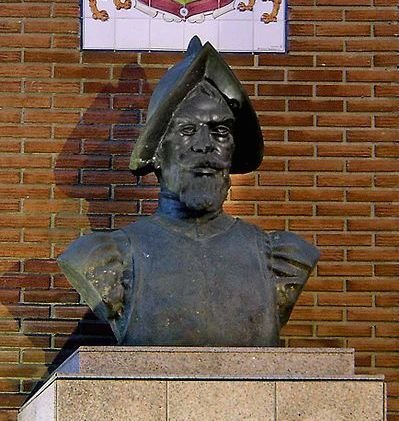
Bernal Diaz del Castillo
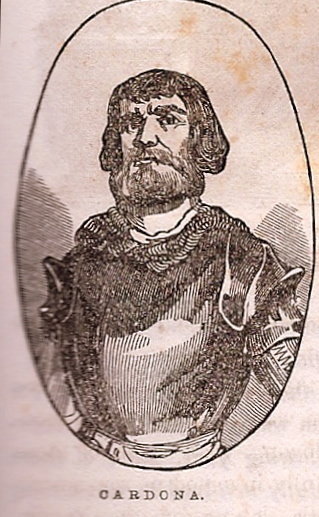
Juan De Leon Cardona

President Ramiro De Leon Carpio
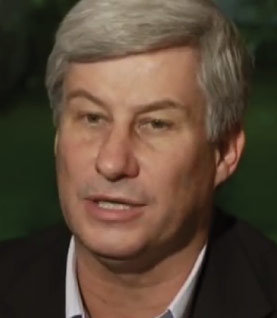
Minister Ricardo Aitkenhead Castillo

Minister Ricardo Castillo Sinibaldi
Why extractive institutions survived?
all descendants of Spanish conquistadors
Consequences
Democratic rules, introduced in 1945, didn't last long
Civil wars broke out in 1954 & lasted until 1986
Vast majority of indigenous people
continued to work as low-wage workers

Today's Road Map
Guatemala before/after independence
US South before/after American Civil War
Sierra Leone before/after independence
Ethiopia before/after 1974 coup
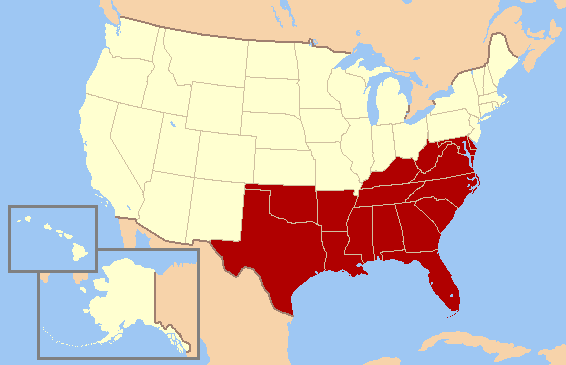
Image source: Wikimedia Commons
U.S. South before American Civil War (1861-65)
Plantation owners: dominate politics
Slaves: have few rights of any kind
Only 9% of population live in urban areas (cf. 35% in Northeast)
Density of railroads / canals: 1/3 of the North
# of patents issued for cotton-making during 1837-1859: 1 per year
Political/economic institutions: extractive
Economic backwardness as a result
Total manufacturing output in 1860:
Lower than Pennsylvania, New York, or Massachusetts
% of slaves
in 1840
Source: Maps 18 & 19 of Why Nations Fail
% of manufacturing
workers in 1880


Extractive Economic Institutions
Economic Stagnation
Extractive Political Institutions
That is...
Institutional reforms after Civil War
Slavery: abolished
Black men: given the right to vote
Freed slaves: promised to receive 40 acres of land & a mule
| economic institutions | ||
|---|---|---|
| Secure for everyone |
Property rights | Insecure for majority of people |
| Free | Occupational choice |
Forced labor |
| Free | Entry of new businesses | Prevented by monopolies |
| Unbiased | System of laws | Biased for the powerful/rich |
| Promoted | Public service provision | Discouraged |
Economic Institutions
Inclusive
Extractive
Property rights
Secure for everyone
Insecure for majority of people
Occupational choice
Free
Forced labor
Entry of new businesses
Free
Prevented by monopolies
System of laws
Unbiased
Biased for the powerful / rich
Public service provision
Provided
Limited
That is...
But extractive institutions persisted
Slavery: replaced with the Black Code
Black men: de facto disenfranchised by literacy test and poll tax
Land redistribution to black people: never implemented
Black Code
Passed by Alabama's state legislature in 1865
Restricts labor mobility
Forced labor continues despite the abolition of slavery
To reduce competition in labor market
so wages would be kept low
| economic institutions | ||
|---|---|---|
| Secure for everyone |
Property rights | Insecure for majority of people |
| Free | Occupational choice |
Forced labor |
| Free | Entry of new businesses | Prevented by monopolies |
| Unbiased | System of laws | Biased for the powerful/rich |
| Promoted | Public service provision | Discouraged |
Economic Institutions
Inclusive
Extractive
Property rights
Secure for everyone
Insecure for majority of people
Occupational choice
Free
Forced labor
Entry of new businesses
Free
Prevented by monopolies
System of laws
Unbiased
Biased for the powerful / rich
Public service provision
Provided
Limited
That is...
But extractive institutions persisted
Slavery: replaced with the Black Code
Black men: de facto disenfranchised by literacy test and poll tax
Land redistribution to black people: never implemented
Land redistribution revoked
During the war,
freed slaves were offered the promise of 40 acres and a mule
President Andrew Johnson revoked the promise in 1865
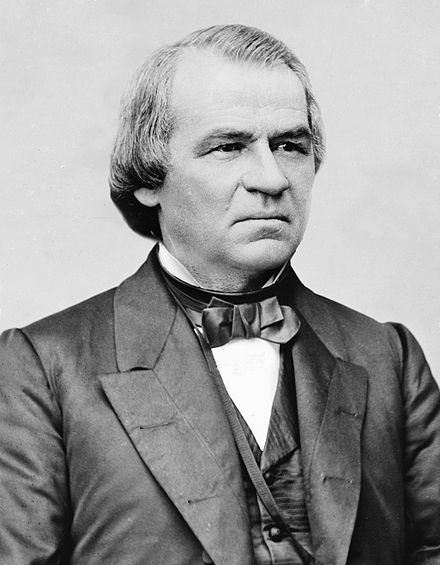
| economic institutions | ||
|---|---|---|
| Secure for everyone |
Property rights | Insecure for majority of people |
| Free | Occupational choice |
Forced labor |
| Free | Entry of new businesses | Prevented by monopolies |
| Unbiased | System of laws | Biased for the powerful/rich |
| Promoted | Public service provision | Discouraged |
Economic Institutions
Inclusive
Extractive
Property rights
Secure for everyone
Insecure for majority of people
Occupational choice
Free
Forced labor
Entry of new businesses
Free
Prevented by monopolies
System of laws
Unbiased
Biased for the powerful / rich
Public service provision
Provided
Limited
That is...
But extractive institutions persisted
Slavery: replaced with the Black Code
Black men: de facto disenfranchised by literacy test and poll tax
Land redistribution to black people: never implemented
Jim Crow laws
Poll taxes
Literacy test for voting
Black people
effectively disenfranchised
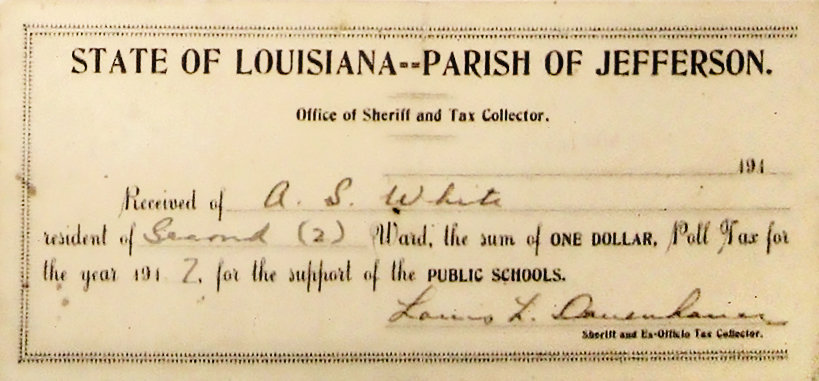
Image source: Wikimedia Commons
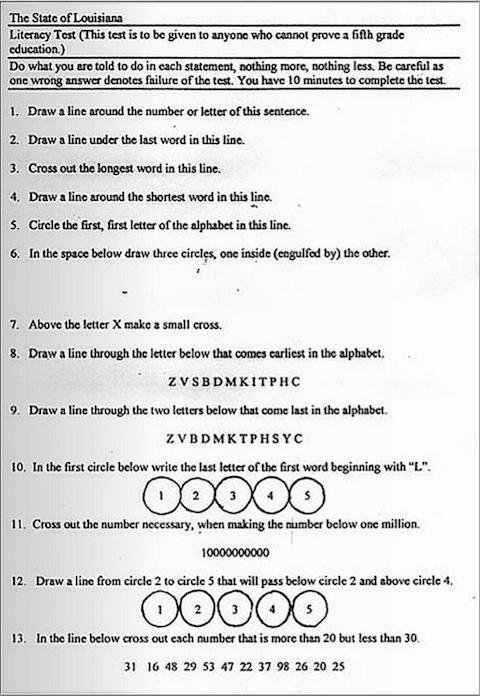
Poll tax receipt in 1917
Image source: openculture.com
Jim Crow laws (cont.)
Separate schools for black people
Section 256 of Alabama state's constitution
e.g.
"Duty of legislature to establish and maintain public school system; apportionment of public school fund; separate schools for white and colored children."
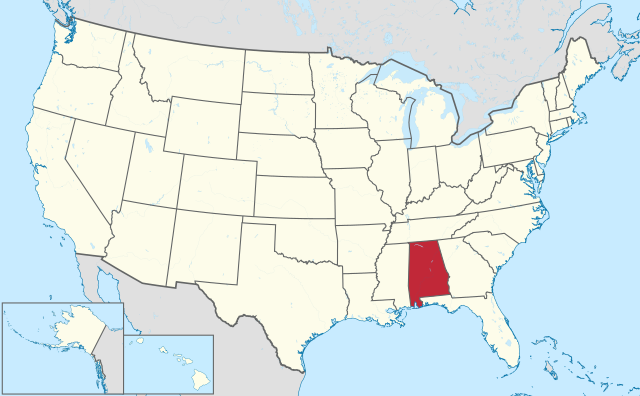
Extractive Economic Institutions
Economic Stagnation
Extractive Political Institutions
That is...
Why extractive institutions survived?
A slaveholder:
exempted from military service for every 20 slaves held
236 owns $10,000+ real estate
110 of these 236 still owned $10,000+
In 5 counties of the Black Belt in Alabama
101 of the 236 still owned $10,000+
Because the planter elite survived the Civil War
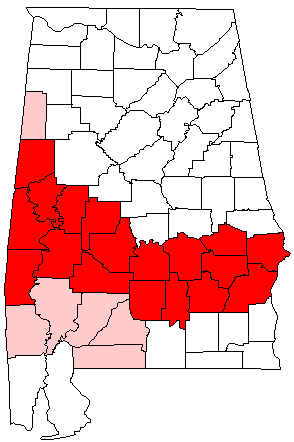
Image source: Wikimedia Commons
1850
1860
1861-65
Civil War
1870
Why extractive institutions survived? (cont.)
The planter elite put pressure on the federal government
1877 presidential election
to obtain the support in southern states
Presidential candidate Rutherford Hayes:
Congressmen from South:
Block any federal projects that would weaken the planter elite
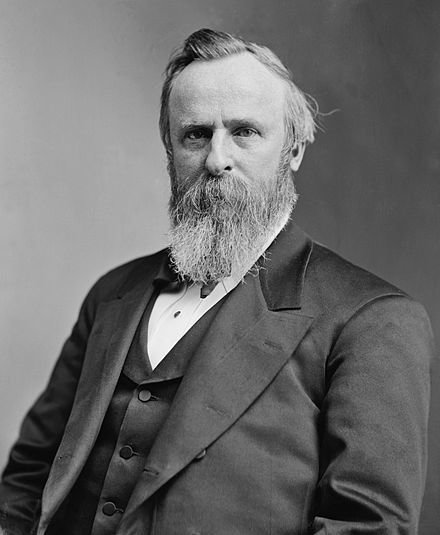
He won and did withdraw the army
Consequences
Remained a rural society in 20th century
% of population lived in cities in 1900
13.5%
in South
Relied on hand labor and mule power, no mechanization
Low levels of education
60%
in Northeast
vs.

Today's Road Map
Guatemala before/after independence
US South before/after American Civil War
Sierra Leone before/after independence
Ethiopia before/after 1974 coup
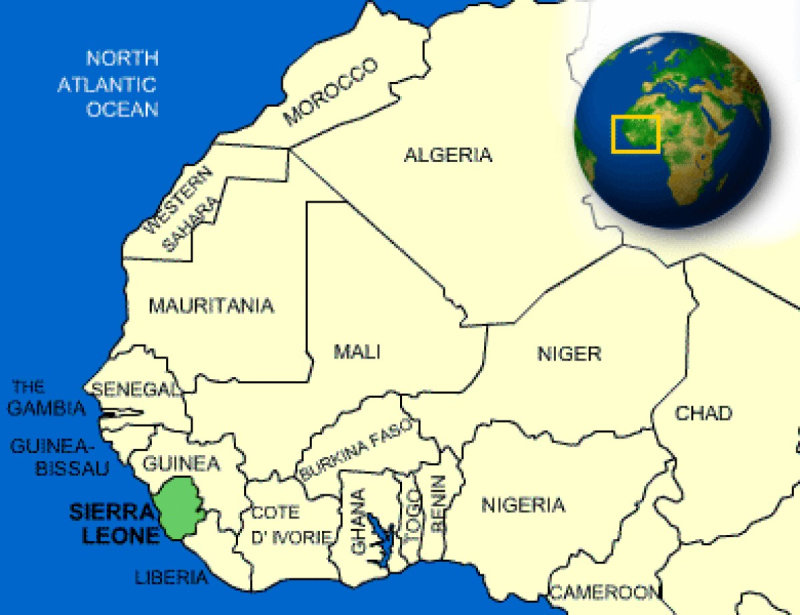
Image source: diamonds.blogs.com
1
2
3
4
British colonial rule of Sierra Leone
Paramount chiefs
Diamond mine monopoly
Marketing board
Railways
Paramount chiefs
Title given by British in 1896
to important local kings
Roles:
Held for life once elected
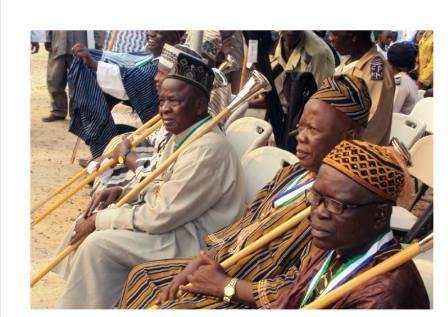
Image source: Sierra Express Media
Collect taxes
Distribute justice
Keep order
Election of paramount chiefs
Eligibility for candidacy:
members of a ruling house (local king's family)
Voting right:
village chiefs / those appointed by paramount chiefs or British
Social stratification created (none existed before colonization)
Marketing Board
Set up by British in 1949
Cocoa/coffee farmers: heavily taxed
Force cocoa/coffee farmers to sell all their produce
At the price a lot less than the world price
| economic institutions | ||
|---|---|---|
| Secure for everyone |
Property rights | Insecure for majority of people |
| Free | Occupational choice |
Forced labor |
| Free | Entry of new businesses | Prevented by monopolies |
| Unbiased | System of laws | Biased for the powerful/rich |
| Promoted | Public service provision | Discouraged |
Economic Institutions
Inclusive
Extractive
Property rights
Secure for everyone
Insecure for majority of people
Occupational choice
Free
Forced labor
Entry of new businesses
Free
Prevented by monopolies
System of laws
Unbiased
Biased for the powerful / rich
Public service provision
Provided
Limited
That is...
Diamond mining monopoly
British set up a monopoly (Sierra Leone Selection Trust)
Diamonds discovered in 1930
granted it to De Beers
cf. Australia (Lecture 7)
| economic institutions | ||
|---|---|---|
| Secure for everyone |
Property rights | Insecure for majority of people |
| Free | Occupational choice |
Forced labor |
| Free | Entry of new businesses | Prevented by monopolies |
| Unbiased | System of laws | Biased for the powerful/rich |
| Promoted | Public service provision | Discouraged |
Economic Institutions
Inclusive
Extractive
Property rights
Secure for everyone
Insecure for majority of people
Occupational choice
Free
Forced labor
Entry of new businesses
Free
Prevented by monopolies
System of laws
Unbiased
Biased for the powerful / rich
Public service provision
Provided
Limited
That is...
Railways
Constructed by British in late 19c
For quick access to Mendeland, the heart of a rebellion in 1898
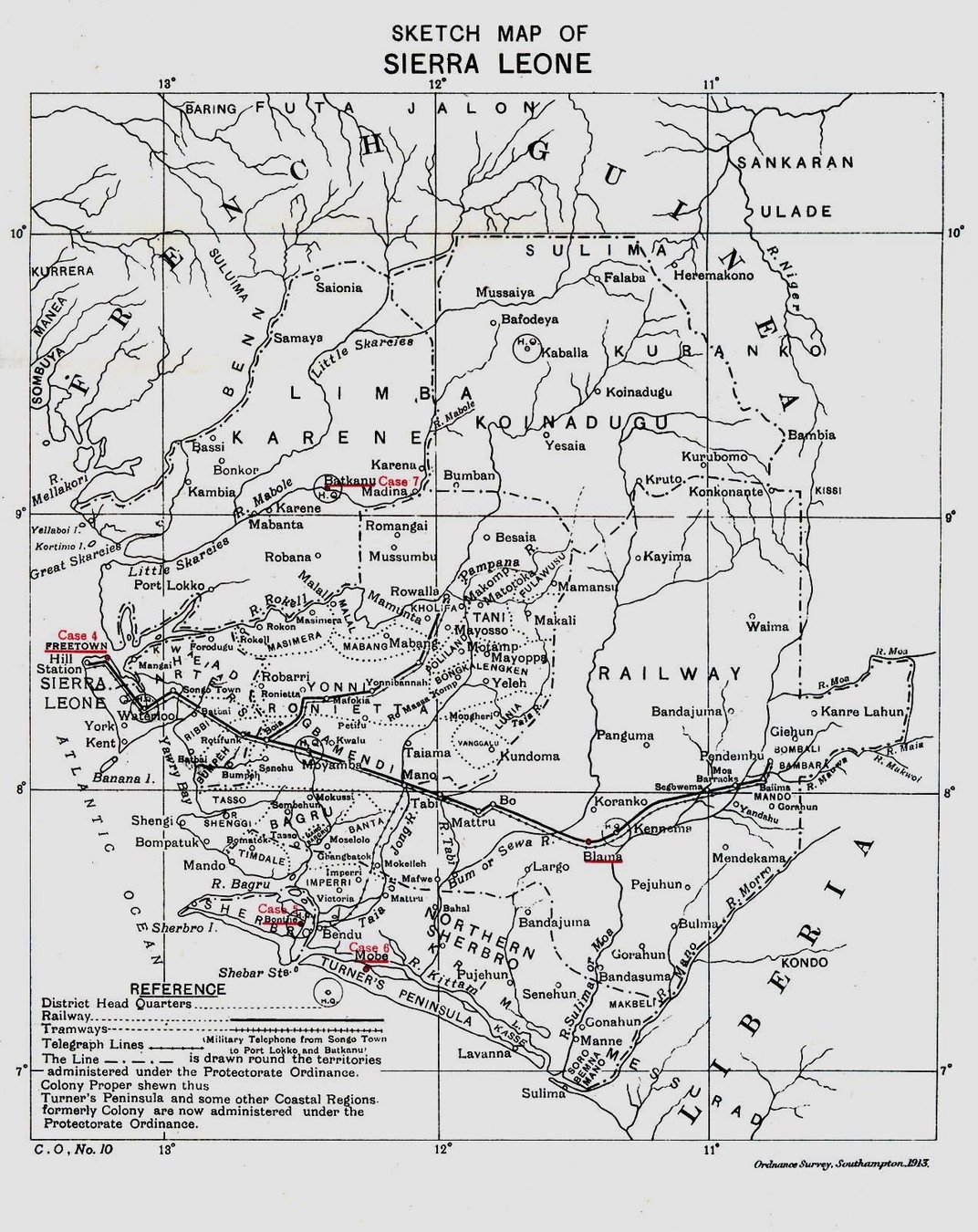
Image source: britishempire.co.uk
Sierra Leone after independence in 1961
1
2
3
4
Paramount chief: no change
Diamond mine monopoly: nationalized
Marketing board: got worse
Railways: suspended for political reasons
Paramount chiefs after independence
Have the last say on who farms where
Not abolished or reformed at all
They still collect taxes today
Land cannot be bought/sold or used as a collateral for loans
Outsiders cannot plant perennial crops (coffee, cocoa, palm)
Adopted instead as a means to control rural areas
| economic institutions | ||
|---|---|---|
| Secure for everyone |
Property rights | Insecure for majority of people |
| Free | Occupational choice |
Forced labor |
| Free | Entry of new businesses | Prevented by monopolies |
| Unbiased | System of laws | Biased for the powerful/rich |
| Promoted | Public service provision | Discouraged |
Economic Institutions
Inclusive
Extractive
Property rights
Secure for everyone
Insecure for majority of people
Occupational choice
Free
Forced labor
Entry of new businesses
Free
Prevented by monopolies
System of laws
Unbiased
Biased for the powerful / rich
Public service provision
Provided
Limited
That is...
Marketing board after independence
Extraction of farmers got worse
Price (as % of world price) at which farmers were forced to sell
palm kernels
cocoa
coffee
mid-1960s
56%
48%
49%
mid-1980s
37%
19%
27%



| economic institutions | ||
|---|---|---|
| Secure for everyone |
Property rights | Insecure for majority of people |
| Free | Occupational choice |
Forced labor |
| Free | Entry of new businesses | Prevented by monopolies |
| Unbiased | System of laws | Biased for the powerful/rich |
| Promoted | Public service provision | Discouraged |
Economic Institutions
Inclusive
Extractive
Property rights
Secure for everyone
Insecure for majority of people
Occupational choice
Free
Forced labor
Entry of new businesses
Free
Prevented by monopolies
System of laws
Unbiased
Biased for the powerful / rich
Public service provision
Provided
Limited
That is...
Diamond mining monopoly after independence
Nationalized in 1970
to create National Diamond Mining Company Ltd.
Railways after independence
1961-67
Used for exporting coffee/cocoa grown by Mende people
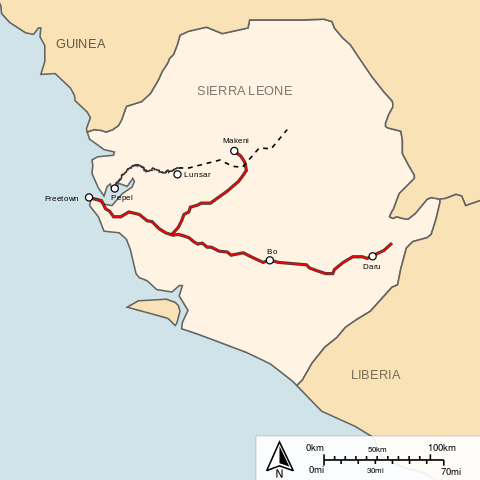
Image source: Wikimedia Commons
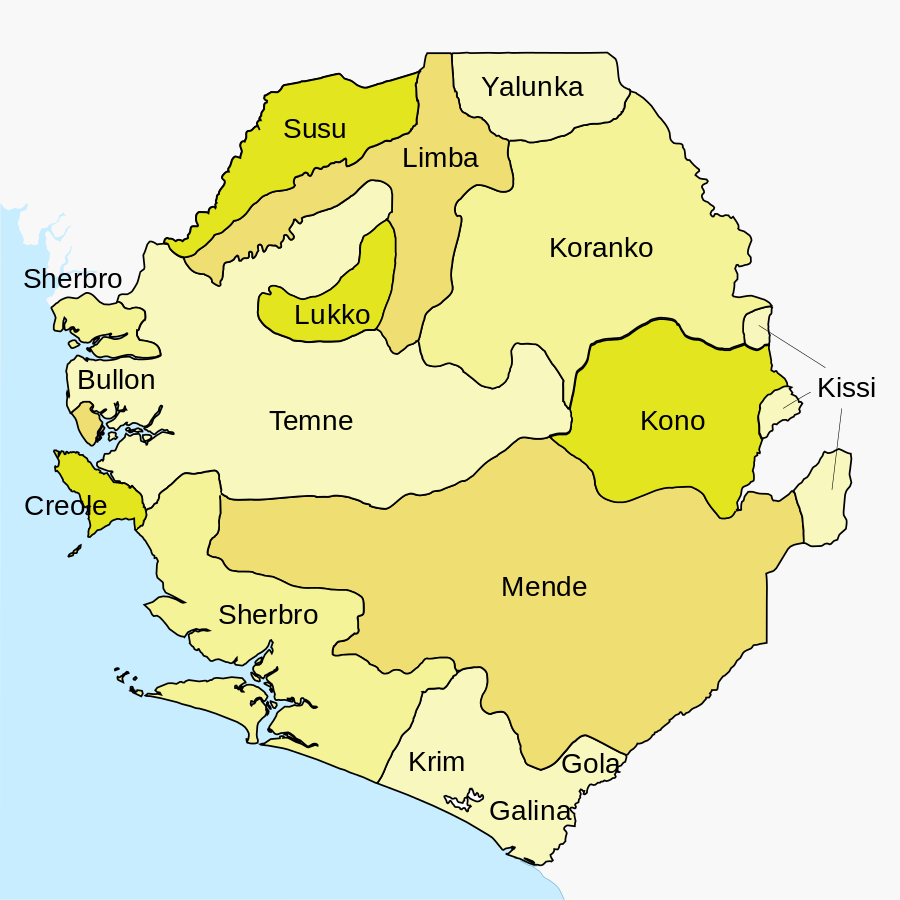
Railway routes
Ethnic groups
Image source: Wikimedia Commons
1967 Election
Ruling party SLPP (supported by Mende people)
Narrowly lost to APC, led by Siaka Stevens
with support of Limba, Temne, Lukko

Ethnic groups
Image source: Wikimedia Commons
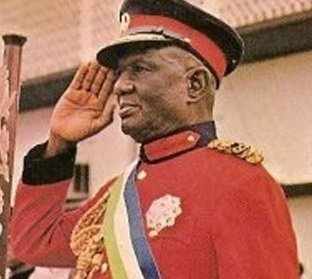
Siaka Stevens
Image source: Wikimedia Commons
Railways after independence (cont.)
Abandoned in 1974 to weaken the opposition (i.e. Mende)

Image source: Wikimedia Commons

Railway routes
Ethnic groups
Image source: Wikimedia Commons
Stevens preferred his political survival to Sierra Leone's economic growth (cf. Austrian/Russian Empires in Lecture 4)
Stevens's dictatorship since 1978
Central bank governor killed after criticizing Stevens in 1980
Opposition parties banned in 1978
Weaken the military and create a paramilitary unit loyal to himself
Inclusive
Extractive
Both
Plurality
and
Centralized
State
Either
Absolutist
or
Lack of
Centralization
Consequences
GDP per capita (in constant 2010 US$)
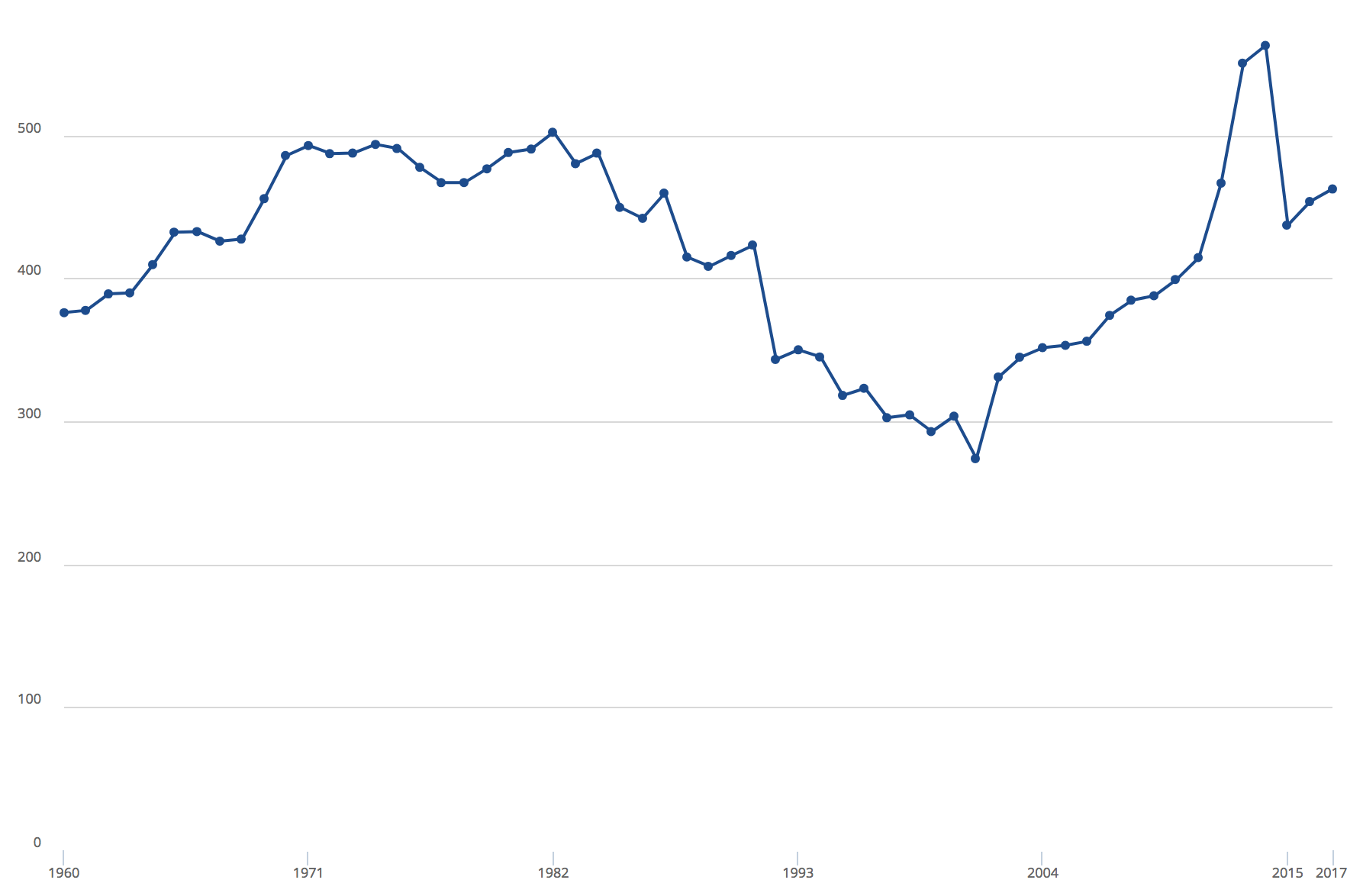
Source: World Development Indicators

Today's Road Map
Guatemala before/after independence
US South before/after American Civil War
Sierra Leone before/after independence
Ethiopia before/after 1974 coup
The 1974 coup in Ethiopia
Derg (Marxist army officers)
ousted Emperor Haile Selassie (cf. Lecture 4)
Many politicians of the Empire were killed
Initial idea:
Create a socialist state by rejecting anything bourgeois
By 1978, materialism became accepted
Designer clothes for senior officials
Major Mengistu became the unchallenged leader
Chose Selassie's Grand Palace to live
Iron Law of Oligarchy
A similar phenomenon observed in other African countries
Democratic Republic of Congo
Dictator Mobutu was ousted by Laurent Kabila,
who then became the next dictator
e.g.
Extractive institutions persist despite leadership changes
When do inclusive institutions emerge?
Glorious Revolution of 1688
French Revolution of 1791
Independence of Africa
since the late 1950s
Rise of merchant class
No entrepreneurship
Broad coalition of opposition
to extractive institutions
A minority group
seeking power
History of
limited inclusive institutions
local inclusive institutions
killed by colonial rules
Week Ten
Chapter 13
Weeks 8-10: Persistence of Extractive Institutions
Week Eight
Chapter 9
Week Nine
Chapter 12
Colonization of
Southeast Asia by
Europeans in 17c
Slave trade in
sub-Saharan
Africa
British colonization
of South Africa
in 19c
Guatemala
Sierra Leone
Ethiopia
before/after
the 1974 coup
US South
before/after
American Civil War
Zimbabwe
Argentina
Colombia
North Korea
Uzbekistan
Egypt
Next week
Your to-do list until next class
Read Chapter 13 along with
pp. 329-332 on Argentina & pp. 1-4, 61 on Egypt
and post questions on Prulu
1
2
3
Start collecting documents on political/economic events in your country
Assemble data for your country
Politics through the Lens of Economics (2018): Lecture 9
By Masayuki Kudamatsu
Politics through the Lens of Economics (2018): Lecture 9
- 2,314



